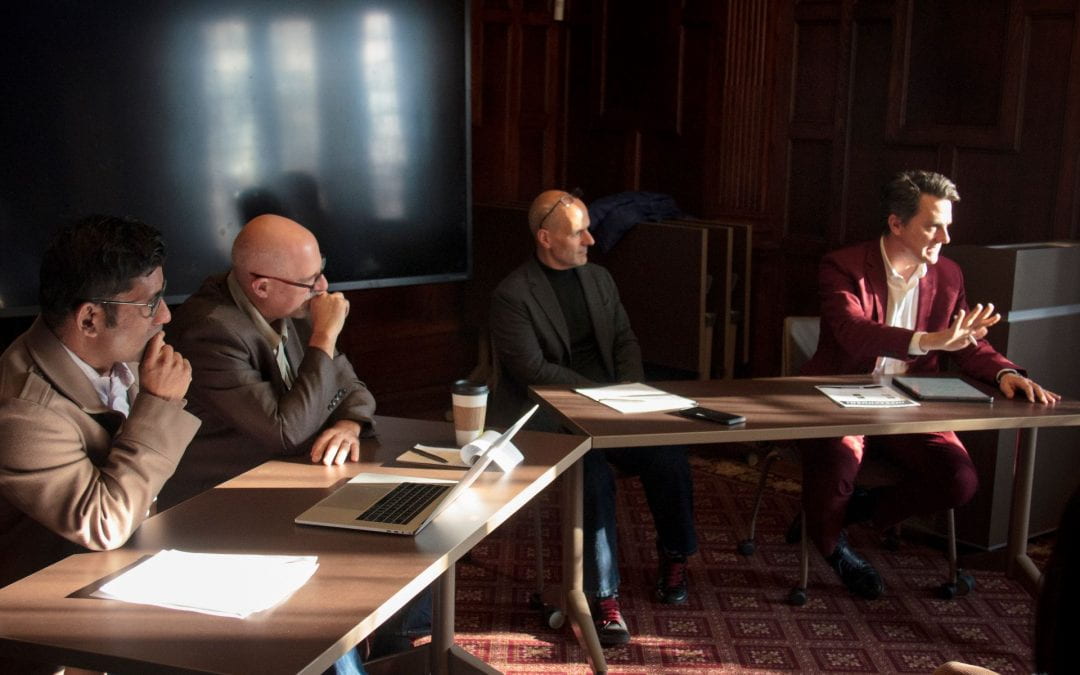The Chicago Center on Democracy brought a panel of esteemed scholars together on November 22nd, 2019, to discuss the comparative politics of impeachment. Participating in the conversation were Tom Ginsburg and Aziz Huq, professors of Law at the University of Chicago, Aníbal Pérez-Liñán, professor of Political Science and Global Affairs at Notre Dame University, and Will Howell, professor of American Politics at the University of Chicago.
The conversation covered how various aspects of impeachment differ across countries, the politics of impeachment, and what the fallout from the impeachment proceedings in the United States today might be.
A recording of the event can be found here. Some key points from the discussion are:
General Takeaways
- About 90 percent of non-parliamentary constitutions contain specific procedures that can be triggered to remove the chief executive. But what counts as impeachable conduct and the process of impeachment itself varies across countries.
- “Removal of a president never hurts democracy,” says Ginsburg; “democracy is always at least as strong thereafter.” This is even true of impeachment without removal. Impeachment deters present and future chief executives from using a particular undemocratic strategy again.
- There is a real possibility of impeachment, non-removal, and reelection today in the United States, which is unprecedented even from a comparative perspective. As Ginsburg notes, “if we’re in uncharted territory, that’s probably not a good thing for the health of the political system.”
Politics of Impeachment
- “The reason why impeachment is so controversial is that […] it’s a constitutional animal with a political body and a legal soul,” says Pérez-Liñán. No matter how precise a constitution may be about impeachment, there will always be debates over interpretation, and so impeachment always comes down to the legislature, which means politics will be involved.
- And “politics is a hard constraint on impeachment,” says Ginsburg. “The only time we see presidents removed, really, is when they’ve lost the support of their party.”
- Party ID and popular opinion are the two most politically salient factors in impeachment proceedings. The president’s supporters may defect if the people are angry enough. Conversely, the opposition may refuse to open impeachment proceedings if the chief executive is too popular.
- Finally, the consequences of impeachment might also shape its politics. Unlike the United States, most countries have new elections after impeachment. According to Ginsburg, this is valuable. If impeachment simply empowers a Vice President of the same party as the President, the opposition might be less interested in initiating the proceedings.
What is Impeachable?
- “What counts as being impeachable is being actively constructed by a back and forth between, on the one hand, elite contestation” over legal considerations, says Huq, “and on the other hand, what’s going on in this much more inchoate and fluid sphere of public discourse and public sentiment.”
- Criminal behavior is the most common justification for impeachment, present in about half of all constitutions. Abuse of constitutional trust is the next most common justification. An example of abusing constitutional trust would be using the powers of the executive office to subvert democracy. Treason is cited as an impeachable offense in about 25% of constitutions, incapacity is impeachable about 15% of the time, and 10% of constitutions allow impeachment if public dissatisfaction is high enough.
- Internationally, even maladministration can be grounds for impeachment. But Ginsburg and Huq point out that a lower standard for impeachment might be a good thing.
Mechanisms of Impeachment
- Impeachment is often a legislative affair, although in some countries, impeachment proceedings begin in the cabinet. The exact legislative procedure can vary significantly by country.
- In the United States, the courts have recused themselves from impeachment proceedings, but sometimes courts have a role in impeachment proceedings internationally.
- Finally, citizens are occasionally involved as well. Some countries allow the people to trigger a recall by gathering enough signatures, while others allow a referendum on the legislature’s decision to impeach.
See the full discussion on the Chicago Center on Democracy’s Facebook page: https://www.facebook.com/ChicagoCenterOnDemocracy
Written by Justin Saint-Loubert-Bié
